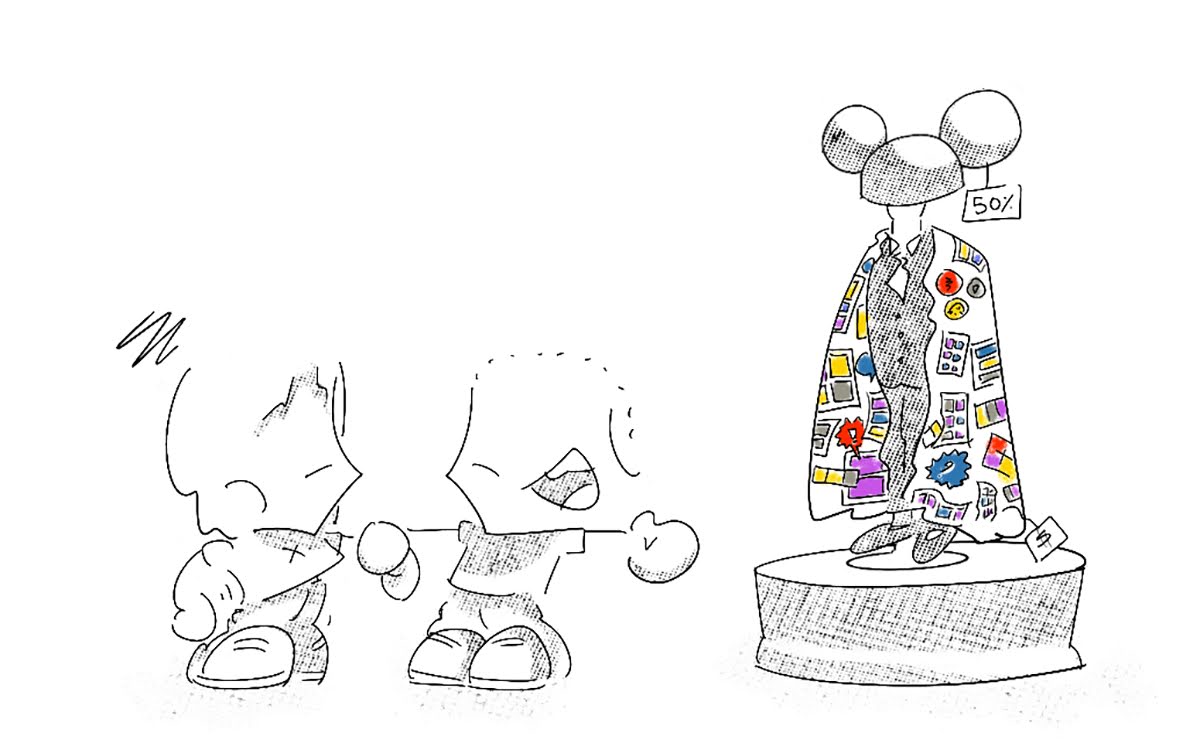licença em bd pós-cultural
« primeiro ciclo »

in "The Biologic Show" 6 jan 2021
Ainda não foi desta que a nossa alma mater (*) Ou uma delas. Começámos na Av. de Berna mas rapidamente rumámos às fronteiras da cidade universitária e o último grau fomos buscar à invicta: OS POSITIVOS, de alma errante. avançou com uma licenciatura em banda desenhada. Frentes a acompanhar sempre que transpirar ao zeitgeist alguma relevância, e porque afecta a um departamento que nos é próximo teremos também de saber se obrigados a morder a língua nos comentários. Faremos por o descobrir & we'll cross tha bridge when we get there.
Expectantes e curiosos para folhear programas e ignorar programação, torcemos que um tal primeiro ciclo não se contente à coluna do "lápis e papel" mas que justifique a chave dos laboratórios: é uma cena que nos vem de longe. Como é também a nossa relação à natureza de tal empreendimento: um grau superior em banda desenhada? Problematizemos, senhores!
A bd, dos exemplos máximos de uma cultura de consumo descartável-pop-massificada-industrial só possível numa sociedade rendida-capitalista, aterrada nas mesmas instituições que servem de baluarte à legitimidade da alta cultura e decisores dos cânones oficiais entre elites intelectuais? Com esse chuto na porta que agradecemos ao colapso de certos valores espreitamos sala adentro à procura de tiques de autoritarismo sempre presentes — tão naturais como a nossa convicção que que a apropriação dos comics pela academia, museus, arte com A grande et al, é um processo tentado de cima para baixo a ser contrariado tombando o topo à terra. São politics. A distinção entre alta e baixa cultura perde o seu sentido e as metanarrativas a sua credibilidade, mas o neo-Gramsci-pós-Marxista em nós ainda suspeita da hegemonia dos outros — é da nossa má formação — e não escondemos a que lado passamos munição num debate incerto onde a cultura nem surge espontaneamente de baixo ou é imposta de cima, antes uma tensão constante de incorporação ou resistência — é do nosso mau feitio. A casualidade duma licenciatura em banda desenhada por uma instituição de ensino superior presta-se assim a diversas tensões que resolvemos em 3 partes, duas a desenvolver posteriormente:
- I) Das tensões entre uma instituição votada à produção de saber científico, intelectualmente especializado, maquinada por ritos rígidos de tradição elitista e aterradora seriedade vs. um meio cuja natureza acolhe sem imaginação caracterizações que vão do descartável, banal, acriançado, inconsequente, produto industrial massificado que só entra à esfera cultural onde cultura desce uns degraus;
- II) Das tensões internas à própria bd (des)contextualizada num ambiente que lhe é desavindo, especificamente do exercício de seleção e valorização de uma parte dos seus artefactos/textos/rabiscos (*) "Textos" como em "não literalmente textos". quando todos se justificam pela sua leitura, uma literalmente conotada ao consumo mais rasteiro por oposição à apropriação instrumental-ideológica que raras excepções e mil-e-um manifestos nossos falham em incentivar entre os pares (*) Mas hey, fuck-u-guys..
- III) De pares pouco impressionáveis e da previsível justificação aos trajectos que se adivinham chegados à nossa terceira e última tensão (tesão?): quando um excesso de interpretação estética focada nos "sentidos, prazeres e identidades sociais" dos textos ignoram "as relações políticas da sua produção e reprodução", o nosso bone to pick com os mass media e outros canais de comunicação que suam bonecada por todos os poros menos das capilares de quem os pensa.
Regressemos ao primeiro embate: comics vs universidade.
Saying popular culture (or more usually, mass culture) and high culture (or more usually, just culture) is just another way of saying ‘them’ and ‘us’. They speak with the authority and support of a powerful discourse behind them. Those of us who reject this discourse, recognizing its thinking and unthinking elitism, find ourselves often with only the discursive support of the (often equally disabling) ideology of populism. The task for new pedagogies of popular culture is to find ways of working which do not fall victim to the disabling tendencies of, on the one hand, a dismissive elitism, and on the other, a disarming anti-intellectualism.
John Storey in "Cultural Theory and Popular Culture: An Introduction" 1993 (*) Citamos duma edição posterior, s/d? e será o mais tardio que vamos buscar à prateleira.
Parece ser necessário um equilíbrio, a nossa deixa para alternar entre extremos. Conhecem-nos: neste espaço o pêndulo balança entre o anti-intelectualismo primário — intencional — e devaneios a escorregar em ideologias de massas acrítico — mais por reflexo do que passo premeditado, shit happens. Uma dualidade que nem podemos alegar original, herdámos de trás, de outros que já o pensaram e disseram (raramente fizeram) melhor. A civilização perdeu essa guerra, e na companhia dos vândalos que tomaram o castelo brindamos à anarquia erguendo os crânios dos que foram a combate: é tudo muito pós-moderno, dizem-nos. Mas — dizem-nos tanta coisa,
When it becomes possible for people to describe as ‘postmodern’ the decor of a room, the design of a building, the diegesis of a film, the construction of a record, or a ‘scratch’ video, a television commercial, or an arts documentary, or the ‘intertextual’ relations between them, the layout of a page in a fashion magazine or critical journal, an anti-teleological tendency within epistemology, the attack on the ‘metaphysics of presence’, a general attenuation of feeling, the collective chagrin and morbid projections of a post-War generation of baby boomers confronting disillusioned middle age, the ‘predicament’ of reflexivity, a group of rhetorical tropes, a proliferation of surfaces, a new phase in commodity fetishism, a fascination for images, codes and styles, a process of cultural, political, or existential fragmentation and/or crisis, the ‘de-centring’ of the subject, an ‘incredulity towards metanarratives’, the replacement of unitary power axes by a plurality of power/ discourse formations, the ‘implosion of meaning’, the collapse of cultural hierarchies, the dread engendered by the threat of nuclear self-destruction, the decline of the university, the functioning and effects of the new miniaturised technologies, broad societal and economic shifts into a ‘media’, ‘consumer’ or ‘multinational’ phase, a sense (depending on who you read) of ‘placelessness’ or the abandonment of placelessness (‘critical regionalism’) or (even) a generalised substitution of spatial for temporal coordinates – when it becomes possible to describe all these things as ‘postmodern’ . . . then it’s clear we are in the presence of a buzzword.
Dick Hebdige in "Hiding in the Light" 1998 (*) Mesmo Dick em estilos de subculturas. E o ano não engana: as nossas referências vão-se ficar por essas décadas, depois desistimos de acompanhar — aquilo do anti.
Word. Com pictures também. Desenham-se bonecos que se perdem entre tantas linhas soltas e contradições a evitar. A que nos importa:
For cultural studies to remain separate [from the economic aspects of media institutions and the broader economic dynamics of consumer culture] is to remain politically ineffective and to remain complicit with the prevailing exploitative and oppressive structures of powers.
John Storey in "Cultural Theory and Popular Culture: An Introduction" 1993
Quando voltarmos: estruturas opressivas de poder e como explorá-las.
 old no-news
old no-news